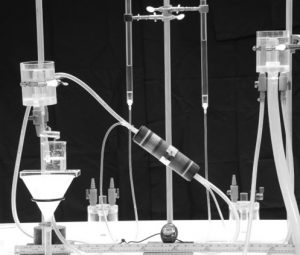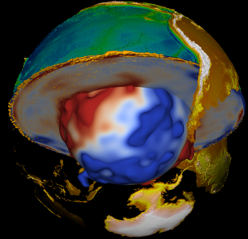GEO 315L Earth From Lab to Planet
GEO 315L Earth From Lab to Planet
Spring 2024
M/W 9:00 a.m. – 10:30 a.m.
Unique #27330

Peter B. Flemings and Thorsten W. Becker
Link to Syllabus: Earth From Lab to Planet
Dr. Peter Flemings introduces the new Earth from Lab to Planet course in this video: Introduction to Lab to Planet: Earth Dynamics
 Goals for the course
Goals for the course
- Develop quantitative intuition for underlying physical and chemical processes that control earth dynamics.
- Explore geoscience problems from a process-based perspective.
- Develop systems approach to understand earth behavior
- Five modules explore different physical laws, each using:
– ‘Hands-on’ lab experiments
– Theory and application to Earth
– Computer experiments
Why should you take this course?
The Earth needs you! The challenges are enormous, ranging from the need to provide fresh water, to understand and predict the impact of climate change, to provide clean energy, to assess earthquake hazards. If you are going to solve these challenges, you need to quantitatively understand the individual processes that affect earth’s evolution and you need to ‘see’ how these processes interact to control earth behavior.
We can’t tell you exactly what job you will have in 10 years. We can guarantee that employers will search for individuals with a quantitative foundation who can solve problems at multiple scales. This course will teach you to understand micro-scale processes and then, equally importantly, how to step back and envision how these micro-scale processes interact to drive larger behavior. This approach will be an enormous lever for you, regardless of what path you choose.
What is ‘Lab to Planet’?
This course explores the physical laws that explain the dynamical changes we observe on the surface and interior of our planet, from tectonic to generational timescales. Five modules will explore different earth behaviors. Each module uses “hands-on” experiments, in the lab and on the computer, to illuminate particular geodynamical processes or material behavior in isolation. We then use abstractions from these experiments to understand how those processes can be scaled up to understand Earth dynamics, from regional groundwater transport to global mantle convection. Based on the “toy models” that can be constructed, we will discuss basic theory to build our intuition for the controlling mechanisms for Earth behavior.
The course has no pre-requisites:
It provides a foundation for exploring geoscience problems from a quantitative, process-based, systems perspective, but there are no prerequisites. Any calculus or other math topics beyond basic algebra will be introduced on the fly and always with specific problems in mind. We likewise do not require any prior exposure to earth science and this class can be a first introduction to geoscience problems to students from physics, engineering, and related natural science fields.

